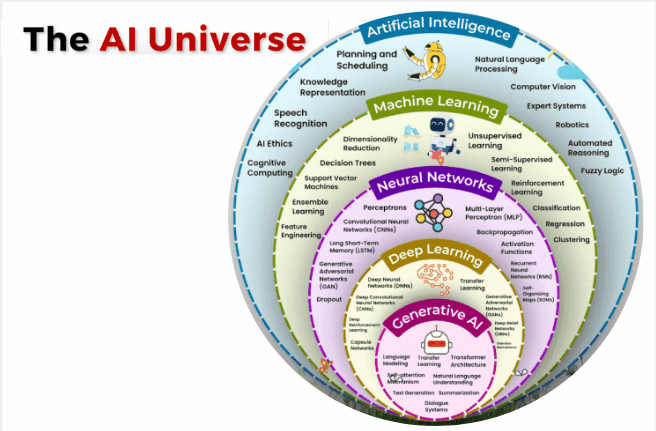
The AI Universe
The AI Universe refers to the vast and interconnected ecosystem of artificial intelligence technologies, principles, and applications. It encompasses everything from fundamental theories and algorithms to cutting-edge innovations and real-world implementations. Below, we explore the main components and dynamics of this universe.
1. Core Concepts
The foundation of the AI Universe lies in its core concepts:
- Machine Learning (ML): Algorithms that enable systems to learn from data and improve over time without explicit programming.
- Deep Learning: A subset of ML that uses neural networks with many layers to model complex patterns in large datasets.
- Natural Language Processing (NLP): Techniques for enabling machines to understand, interpret, and generate human language.
- Computer Vision: The ability of AI to interpret and analyze visual data, such as images and videos.
- Reinforcement Learning: Learning by trial and error through interaction with an environment.
2. AI Disciplines
AI spans multiple disciplines and subfields, including:
- Expert Systems: Simulating human decision-making in specific domains.
- Robotics: The integration of AI in machines to perform physical tasks.
- Cognitive Computing: Systems designed to simulate human thought processes.
- Generative AI: Models that create new content, such as text, images, or music.
3. Enabling Technologies
The growth of the AI Universe depends on several enabling technologies:
- Big Data: Vast datasets that provide the fuel for AI training and decision-making.
- Cloud Computing: Scalable infrastructure for storing and processing AI workloads.
- GPUs and TPUs: Specialized hardware for accelerating AI computations.
- IoT (Internet of Things): Connected devices that generate real-time data for AI systems.
4. Applications of AI
AI impacts virtually every sector:
- Healthcare: Disease diagnosis, drug discovery, personalized medicine.
- Finance: Fraud detection, algorithmic trading, credit scoring.
- Transportation: Autonomous vehicles, traffic optimization.
- Education: Personalized learning, automated grading.
- Entertainment: Content recommendations, game development.
5. Ethics and Challenges
As the AI Universe expands, it raises important ethical and practical challenges:
- Bias and Fairness: Ensuring AI systems do not perpetuate or amplify biases.
- Privacy: Safeguarding user data in AI applications.
- Transparency: Making AI decision-making understandable to humans.
- Job Displacement: Addressing the impact of automation on employment.
6. Future of the AI Universe
The AI Universe is constantly evolving. Emerging trends include:
- General AI: Developing systems with human-like cognitive abilities across diverse tasks.
- Quantum AI: Leveraging quantum computing to solve complex AI problems.
- Ethical AI: Ensuring AI development aligns with human values and societal well-being.
- Human-AI Collaboration: Enhancing human productivity and creativity with AI tools.
